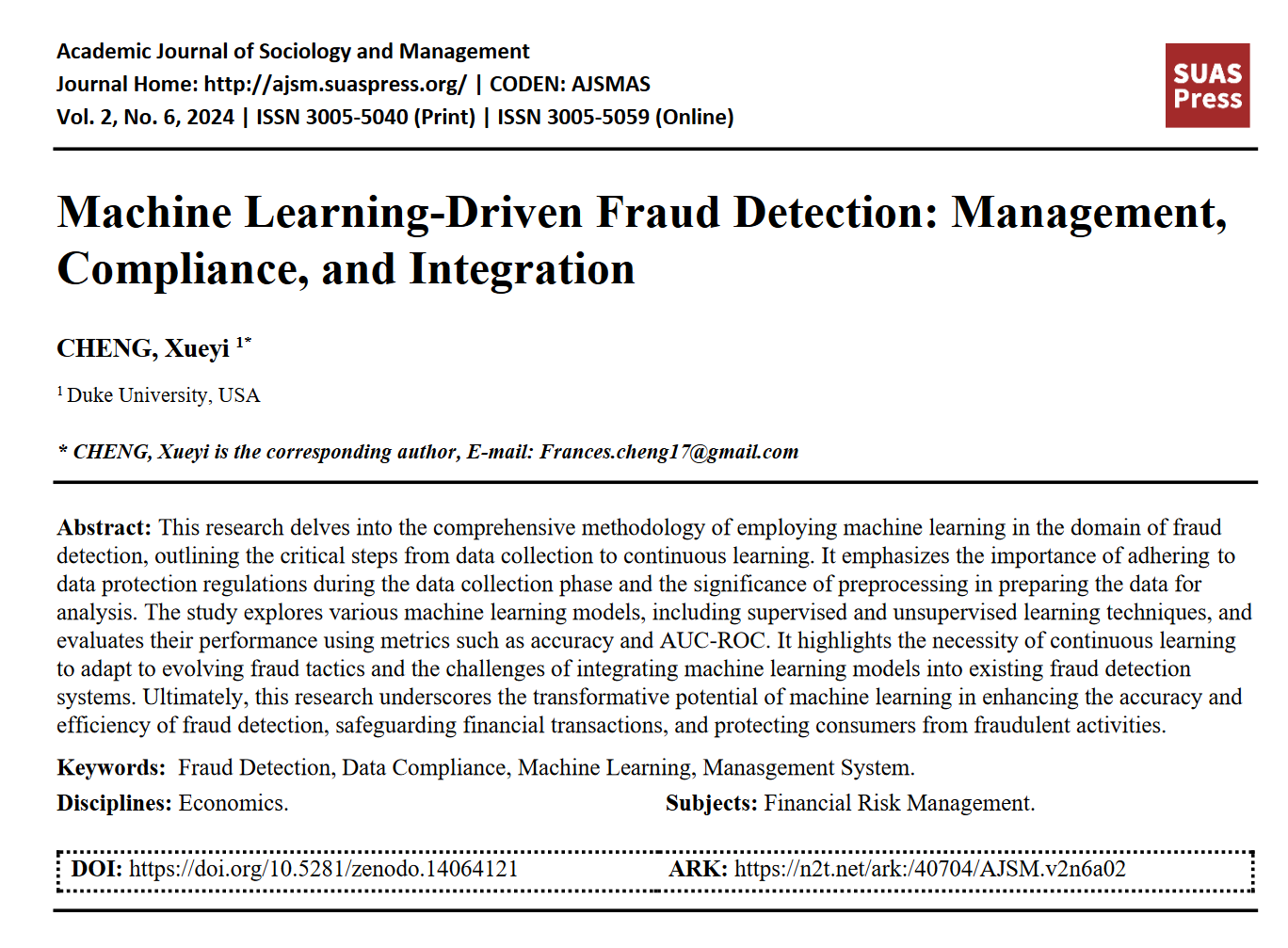Machine Learning-Driven Fraud Detection: Management, Compliance, and Integration
DOI:
https://doi.org/10.5281/zenodo.14064121ARK:
https://n2t.net/ark:/40704/AJSM.v2n6a02Disciplines:
EconomicsSubjects:
Financial Risk ManagementReferences:
20Keywords:
Fraud Detection, Data Compliance, Machine Learning, Manasgement SystemAbstract
This research delves into the comprehensive methodology of employing machine learning in the domain of fraud detection, outlining the critical steps from data collection to continuous learning. It emphasizes the importance of adhering to data protection regulations during the data collection phase and the significance of preprocessing in preparing the data for analysis. The study explores various machine learning models, including supervised and unsupervised learning techniques, and evaluates their performance using metrics such as accuracy and AUC-ROC. It highlights the necessity of continuous learning to adapt to evolving fraud tactics and the challenges of integrating machine learning models into existing fraud detection systems. Ultimately, this research underscores the transformative potential of machine learning in enhancing the accuracy and efficiency of fraud detection, safeguarding financial transactions, and protecting consumers from fraudulent activities.
Downloads
Metrics
References
Che, C., Hu, H., Zhao, X., Li, S., & Lin, Q. (2023). Advancing Cancer Document Classification with R andom Forest. Academic Journal of Science and Technology, 8(1), 278-280.
Liu, B., Yu, L., Che, C., Lin, Q., Hu, H., & Zhao, X. (2024). Integration and performance analysis of artificial intelligence and computer vision based on deep learning algorithms. Applied and Computational Engineering, 64, 36-41.
Huang, Z., Zheng, H., Li, C., & Che, C. (2024). Application of machine learning-based k-means clustering for financial fraud detection. Academic Journal of Science and Technology, 10(1), 33-39.
Che, C., Liu, B., Li, S., Huang, J., & Hu, H. (2023). Deep learning for precise robot position prediction in logistics. Journal of Theory and Practice of Engineering Science, 3(10), 36-41.
Che, C., Lin, Q., Zhao, X., Huang, J., & Yu, L. (2023, September). Enhancing Multimodal Understanding with CLIP-Based Image-to-Text Transformation. In Proceedings of the 2023 6th International Conference on Big Data Technologies (pp. 414-418).
Huang, Z., Che, C., Zheng, H., & Li, C. (2024). Research on Generative Artificial Intelligence for Virtual Financial Robo-Advisor. Academic Journal of Science and Technology, 10(1), 74-80.
Yu, L., Liu, B., Lin, Q., Zhao, X., & Che, C. (2024). Similarity matching for patent documents using ensemble bert-related model and novel text processing method. Journal of Advances in Information Technology, 15(3).
Hu, H., Li, S., Huang, J., Liu, B., & Che, C. (2023). Casting product image data for quality inspection with xception and data augmentation. Journal of Theory and Practice of Engineering Science, 3(10), 42-46.
Lin, Q., Che, C., Hu, H., Zhao, X., & Li, S. (2023). A Comprehensive Study on Early Alzheimer’s Disease Detection through Advanced Machine Learning Techniques on MRI Data. Academic Journal of Science and Technology, 8(1), 281-285.
Huang, J., Zhao, X., Che, C., Lin, Q., & Liu, B. (2023, October). Enhancing Essay Scoring with Adversarial Weights Perturbation and Metric-specific AttentionPooling. In 2023 International Conference on Information Network and Computer Communications (INCC) (pp. 8-12). IEEE.
Che, C., Zheng, H., Huang, Z., Jiang, W., & Liu, B. (2024). Intelligent robotic control system based on computer vision technology. Applied and Computational Engineering, 64, 142-147.
Che, C., Huang, Z., Li, C., Zheng, H., & Tian, X. (2024). Integrating generative AI into financial market prediction for improved decision making. Applied and Computational Engineering, 64, 155-161.
Yu, L., Li, C., Gao, L., Liu, B., & Che, C. (2024, March). Stochastic analysis of touch-tone frequency recognition in two-way radio systems for dialed telephone number identification. In 2024 7th International Conference on Advanced Algorithms and Control Engineering (ICAACE) (pp. 1565-1572). IEEE.
Li, C., Zheng, H., Sun, Y., Wang, C., Yu, L., Chang, C., ... & Liu, B. (2024). Enhancing multi-hop knowledge graph reasoning through reward shaping techniques. arXiv preprint arXiv:2403.05801.
Che, C., Li, C., & Huang, Z. (2024). The Integration of Generative Artificial Intelligence and Computer Vision in Industrial Robotic Arms. International Journal of Computer Science and Information Technology, 2(3), 1-9.
Liu, H., Wang, C., Zhan, X., Zheng, H., & Che, C. (2024). Enhancing 3D Object Detection by Using Neural Network with Self-adaptive Thresholding. arXiv preprint arXiv:2405.07479.
Che, C., & Tian, J. (2024). Game Theory: Concepts, Applications, and Insights from Operations Research. Journal of Computer Technology and Applied Mathematics, 1(4), 53-59.
Che, C., & Tian, J. (2024). Analyzing patterns in Airbnb listing prices and their classification in London through geospatial distribution analysis. Advances in Engineering Innovation, 12, 53-59.
Che, C., & Tian, J. (2024). Maximum flow and minimum cost flow theory to solve the evacuation planning. Advances in Engineering Innovation, 12, 60-64.
Cheng, X., Liu, T., Su, G., Che, C., Zhu, C., Liu, K., ... & Hu, X. (2024). Smart Navigation System for Parking Assignment at Large Events: Incorporating Heterogeneous Driver Characteristics. arXiv preprint arXiv:2410.18983.

Downloads
Published
How to Cite
Issue
Section
ARK
License
Copyright (c) 2024 The author retains copyright and grants the journal the right of first publication.

This work is licensed under a Creative Commons Attribution 4.0 International License.

















